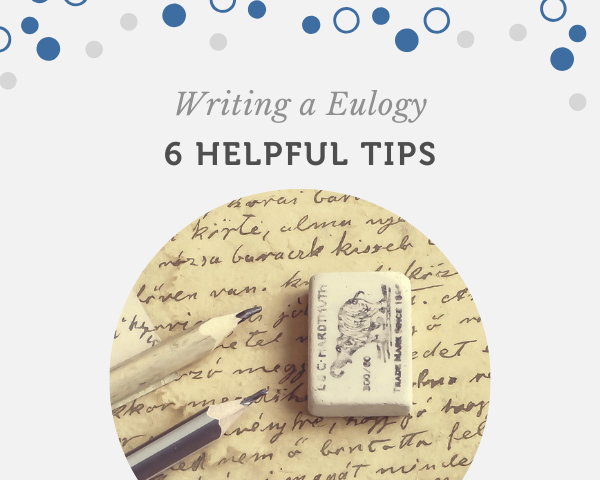A Guide to Writing a Meaningful Eulogy
Writing a eulogy is a unique challenge - losing someone you held dear is hard enough, and then you have to find the right words to give them a meaningful goodbye whilst also trying to bring comfort to those they have left behind. For many, even knowing where to start is one of the toughest parts of writing a eulogy. This comprehensive guide will walk you through each stage of creating a eulogy, from initial planning to delivery, ensuring you can create a meaningful tribute that truly reflects the unique character and memories of your loved one.
Understanding the Purpose and Importance of a Eulogy
Eulogies are one of the most personal parts of any funeral service, as they remind those in attendance of some of their favourite memories of their loved one. These tributes are designed to encapsulate the person's life, achievements, and personality, leaving a lasting impression that honours their unique contributions to the world.
Writing a eulogy can act as a powerful tool for healing, as it requires you to reflect on fond memories and experiences you and others may have shared with the deceased. This provides time to process your emotions and helps you focus on the good times, as well as creating a sense of purpose that can help distract you from some of the negative feelings you may experience while grieving. For the audience, hearing stories and shared memories creates a collective experience of remembrance that can provide comfort and closure. By acknowledging and understanding this deeper purpose, you can ensure that your words serve not just as a tribute, but as a way to help those in attendance with their healing process, as well as your own.
Planning a Eulogy
A good way to begin the process of writing a eulogy is by reflecting on the cherished memories and shared experiences you had with your loved one:
- Think about the moments that defined their character - does something spring to mind that epitomised who they were?
- The lessons they imparted - did they change your outlook or view of things? Did they offer guidance or provide support in challenging moments?
- Remember what was important to them - their hobbies and interests will have shaped who they were as a person, so think if there was anything specific that you could reference or share as part of the eulogy.
- Think of the good times - what fun moments come to mind when you think of your loved one? Are there any funny anecdotes that the two of you may have shared that you could share?
These reflections will provide a foundation for your eulogy, allowing you to create a heartfelt and authentic tribute that resonates with your audience.
One of the most important aspects of preparation is getting input from other people who knew the deceased well. You can ask for their input or any memorable stories they would like included in the eulogy, creating a more complete picture of the life and impact of the deceased. Additionally, make sure that you get the loved ones of the deceased to fact-check what you plan to include in your speech. It is understandable that this may be overlooked or feel intrusive during such an emotional time, but think of it as a way of showing respect to the dead through ensuring that their memories are being shared accurately and meaningfully.
If you are struggling with remembering details, make a note when you think of something or hear someone mention anything that you may wish to include. You could also try creating a timeline of important life events, verifying dates with family members, and double-checking the spelling and (most importantly) the pronunciation of names and places.
How to Structure a Eulogy
When it comes to writing and structuring a eulogy, it is important to make sure that it flows in a way that feels natural and easy to follow, which will help to maximise its impact and show the audience that you have put serious thought and effort into crafting something meaningful.
There are a few approaches you could take, which may suit you better based on your writing style or even the contents of the eulogy itself.
- Chronological - tell their life story, beginning with their childhood and working through the highlights of their life.
- Reverse chronological - beginning with the present or recent past, then working backwards.
- Thematic approach - consider a three-point plan where you decide three key things to say and the order for saying them, or choose one big theme and give examples, anecdotes, and stories to explain and illustrate it.


What to Include in a Eulogy
There are no "rules" that you need to follow when writing a eulogy. Similarly, it is no use copying what someone else has done because it will not necessarily align with what you want to say about your loved one. Instead, focus on writing something that is emotional, meaningful and authentic. Having said this, we understand that it can be hard to find a way to summarise someone’s life into a short speech, so here are some key things to consider when writing the main section of a eulogy.
Say a lot about a little - focus on a few points rather than attempting to cover every aspect of the person's life. This will allow you to go into detail on your key sentiments, maximising their impact and stopping the audience from potentially feeling overwhelmed or a bit lost.
Tell a story - figure out what you want the overall sentiment of your eulogy to be, and then include stories from the person's life that echo these feelings. These stories can be major life turning points or seemingly small moments that perfectly encapsulate who they were and what they meant to people. Sharing funny moments is a great way to provide some welcome comic relief at a difficult time, as long as it is appropriate of course.
Don’t miss out the little things - it’s important to remember that small details help to make people unique, so including these things in your stories make a big impact. Not only will it help to create a more detailed account of the story you may be telling, but it will help to trigger memories in the audience that they may have not initially thought about, and in a more visceral way.
Make it personal - think about what made the person you are speaking about unique. Mention quirks they had or specific characteristics that made them special. These are important to include as they help to reinforce the connection that you and the attendees had with the deceased, as well as honouring them on a deeper level.
Introducing and Concluding a Eulogy
The contents of a eulogy are going to be unique, as they need to be personal and specific to the person you are saying goodbye to. However, there are some elements that are essential to help provide structure and context to what you are talking about.
Your opening should attempt to introduce your relationship with the deceased - you can do this by capturing their essence in a way that also establishes the tone for the rest of your speech. One way of doing this is by starting off with an anecdote that perfectly encapsulates their personality. You could also share a meaningful quote they lived by, or a simple statement that reflects their most defining characteristic.
You can conclude the eulogy in many ways, and what you do is likely to be influenced by the rest of your speech and how you wish to say goodbye to your loved one. Some people choose to end a eulogy with a quote, a poem or a personal message. If you intend to play a piece of music or give a reading after your eulogy, you can end by explaining why you've chosen it. If not, then a good way could be to end with a short sentence of farewell, maybe the very last thing you said to them, or wanted to say to them, before they died. Whatever you choose, the intention should be to provide a final goodbye to the deceased, whilst offering a sense of peace, closure or comfort to the audience.
Preparing and Giving Your Speech
Once you've written your eulogy, it is important to prepare yourself both physically and mentally to ensure that it is delivered effectively, especially during such an emotional time. Below are some tips that we would recommend to help you prepare:
- Practice reading your speech aloud, before the funeral itself - this will allow you to familiarise yourself with the flow and timing.
- Consider the logistics of giving the speech - think about things like whether you will be on a podium, whether you will be using a microphone, and whether you have any extra inclusions set up correctly, like songs or photos, etc.
- Prepare physically - make sure you have a written copy and a backup copy of your speech. Even simple things like ensuring the text is clear and legible for you to read will go a long way.
- Prepare emotionally - accept that you may become emotional during delivery, and plan for this possibility by identifying natural pause points where you can compose yourself if needed.
As important as it is to prepare, remember that showing emotion during a eulogy is not only acceptable but often expected and appreciated by the audience. Your genuine feelings demonstrate the depth of your relationship with the deceased and can help others feel permission to express their own grief.


Addressing Common Challenges and Concerns
One of the most common concerns people have when writing a eulogy is determining what is appropriate content to include. While it's natural to feel a range of emotions during this challenging time, strive to focus on the positive aspects of your loved one's life by celebrating their accomplishments, the love they shared, and the impact they had on those around them.
Many people worry about whether humour is appropriate in a eulogy, but sharing funny stories can provide a welcome comic relief at times like these. However, the key is ensuring that any humour is respectful, appropriate for the audience, and truly reflective of the person's personality. Funny stories should celebrate the person's character rather than embarrass them, and they should feel natural within the overall tone of your tribute.
While there's no strict rule about eulogy length, most effective eulogies range from three to seven minutes, which typically translates to 300-800 words. The key is ensuring that your eulogy feels complete without becoming so lengthy that it loses impact. Remember that other speakers may also be sharing tributes, and the eulogy is just one part of a larger service.
Writing a eulogy represents one of the most meaningful ways to honour a loved one's memory while providing comfort to those who are grieving. Throughout this process, remember that authenticity is the most important element. While this guide can help you structure and refine your eulogy, the heart of your speech should come from your personal connection with the deceased and your desire to celebrate their unique life and legacy.
If you have any further questions about planning a funeral or special requests you would like to make, feel free to contact us on 01424 436 386 or via info@towners.co.uk and we will be happy to help.




